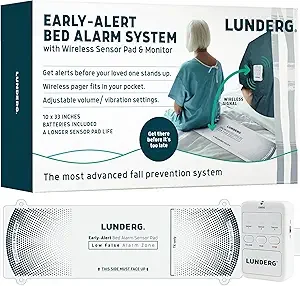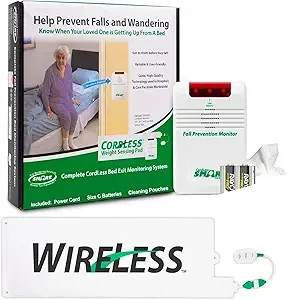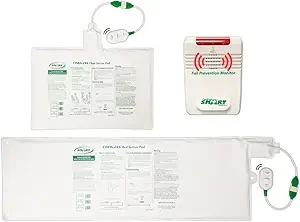Understanding Bed Alarms and Fall Prevention Gear
A caregiver’s guide to staying one step ahead
Falls are one of the most common, and preventable, emergencies in at-home care. Whether you’re supporting a loved one with dementia, limited mobility, or nighttime wandering, the right gear can make all the difference. Bed alarms offer an added layer of safety without turning your home into a hospital. Below are trusted options worth considering, along with tips to use them wisely.
🔹 1. Lunderg Early Alert Bed Alarm System
Unlike standard alarms, the Lunderg system uses a pre-alert sensor that activates as the person starts to sit up—before they’ve fully exited the bed. That early warning gives caregivers critical reaction time to step in before a fall.
Why it’s worth it:
Pre-alert technology for early response
Wireless and discreet
Ideal for dementia and fall-prone patients
🔹 2. Smart Caregiver Cordless Monitoring System
A reliable mid-range option. This setup includes a pressure pad and wireless pager so you’re not stuck bedside waiting for movement.
Why it’s worth it:
No cords to trip over
Pager gives freedom to move around
Clean design that’s simple to use
🔹 3. Smart Caregiver Bed & Chair Pad Combo
This one’s all about versatility. It comes with both bed and chair pads—perfect for round-the-clock monitoring without constant repositioning of a single device.
Why it’s worth it:
Covers multiple locations
Trusted by long-term care facilities
Affordable entry point for daily care
🛠 Using Alarms Effectively
Alarms only help when used intentionally. Here are some real-world tips for smarter care:
Avoid Alarm Overload
Too many beeping devices can overwhelm or agitate. Choose your battles—place alarms where risk is highest.Know Your Types
Pressure pads: Go under the sheets or on chairs
Floor mats: Trigger when stepped on
Wearables: Detect movement but may feel invasive to some patients
Don’t Rely on Tech Alone
Bed alarms are just that—alarms. They can’t physically stop a fall. They're most useful when someone is nearby and ready to respond.
💡 Who Can Benefit?
Dementia or Alzheimer’s patients
Those with poor balance or recent falls
Anyone recovering from surgery or stroke
Night wanderers or “I’ll do it myself” types



